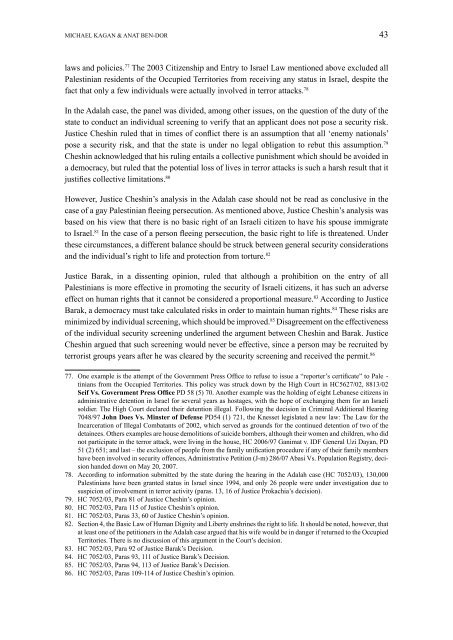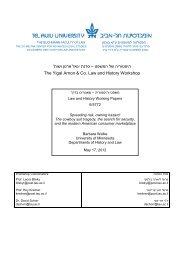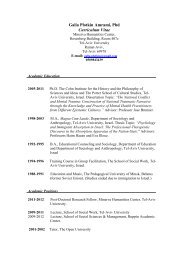NOWHERE TO RUN: GAy PALESTINIAN ASyLUM-SEEKERS
NOWHERE TO RUN: GAy PALESTINIAN ASyLUM-SEEKERS
NOWHERE TO RUN: GAy PALESTINIAN ASyLUM-SEEKERS
Create successful ePaper yourself
Turn your PDF publications into a flip-book with our unique Google optimized e-Paper software.
MICHAEL KAGAN & ANAT BEN-DOR 43<br />
laws and policies. 77 The 2003 Citizenship and Entry to Israel Law mentioned above excluded all<br />
Palestinian residents of the Occupied Territories from receiving any status in Israel, despite the<br />
fact that only a few individuals were actually involved in terror attacks. 78<br />
In the Adalah case, the panel was divided, among other issues, on the question of the duty of the<br />
state to conduct an individual screening to verify that an applicant does not pose a security risk.<br />
Justice Cheshin ruled that in times of conflict there is an assumption that all ‘enemy nationals’<br />
pose a security risk, and that the state is under no legal obligation to rebut this assumption. 79<br />
Cheshin acknowledged that his ruling entails a collective punishment which should be avoided in<br />
a democracy, but ruled that the potential loss of lives in terror attacks is such a harsh result that it<br />
justifies collective limitations. 80<br />
However, Justice Cheshin’s analysis in the Adalah case should not be read as conclusive in the<br />
case of a gay Palestinian fleeing persecution. As mentioned above, Justice Cheshin’s analysis was<br />
based on his view that there is no basic right of an Israeli citizen to have his spouse immigrate<br />
to Israel. 81 In the case of a person fleeing persecution, the basic right to life is threatened. Under<br />
these circumstances, a different balance should be struck between general security considerations<br />
and the individual’s right to life and protection from torture. 82<br />
Justice Barak, in a dissenting opinion, ruled that although a prohibition on the entry of all<br />
Palestinians is more effective in promoting the security of Israeli citizens, it has such an adverse<br />
effect on human rights that it cannot be considered a proportional measure. 83 According to Justice<br />
Barak, a democracy must take calculated risks in order to maintain human rights. 84 These risks are<br />
minimized by individual screening, which should be improved. 85 Disagreement on the effectiveness<br />
of the individual security screening underlined the argument between Cheshin and Barak. Justice<br />
Cheshin argued that such screening would never be effective, since a person may be recruited by<br />
terrorist groups years after he was cleared by the security screening and received the permit. 86<br />
77. One example is the attempt of the Government Press Office to refuse to issue a “reporter’s certificate” to Pale -<br />
tinians from the Occupied Territories. This policy was struck down by the High Court in HC5627/02, 8813/02<br />
Seif Vs. Government Press Office PD 58 (5) 70. Another example was the holding of eight Lebanese citizens in<br />
administrative detention in Israel for several years as hostages, with the hope of exchanging them for an Israeli<br />
soldier. The High Court declared their detention illegal. Following the decision in Criminal Additional Hearing<br />
7048/97 John Does Vs. Minster of Defense PD54 (1) 721, the Knesset legislated a new law: The Law for the<br />
Incarceration of Illegal Combatants of 2002, which served as grounds for the continued detention of two of the<br />
detainees. Others examples are house demolitions of suicide bombers, although their women and children, who did<br />
not participate in the terror attack, were living in the house, HC 2006/97 Ganimat v. IDF General Uzi Dayan, PD<br />
51 (2) 651; and last – the exclusion of people from the family unification procedure if any of their family members<br />
have been involved in security offences, Administrative Petition (J-m) 286/07 Abasi Vs. Population Registry, decision<br />
handed down on May 20, 2007.<br />
78. According to information submitted by the state during the hearing in the Adalah case (HC 7052/03), 130,000<br />
Palestinians have been granted status in Israel since 1994, and only 26 people were under investigation due to<br />
suspicion of involvement in terror activity (paras. 13, 16 of Justice Prokachia’s decision).<br />
79. HC 7052/03, Para 81 of Justice Cheshin’s opinion.<br />
80. HC 7052/03, Para 115 of Justice Cheshin’s opinion.<br />
81. HC 7052/03, Paras 33, 60 of Justice Cheshin’s opinion.<br />
82. Section 4, the Basic Law of Human Dignity and Liberty enshrines the right to life. It should be noted, however, that<br />
at least one of the petitioners in the Adalah case argued that his wife would be in danger if returned to the Occupied<br />
Territories. There is no discussion of this argument in the Court’s decision.<br />
83. HC 7052/03, Para 92 of Justice Barak’s Decision.<br />
84. HC 7052/03, Paras 93, 111 of Justice Barak’s Decision.<br />
85. HC 7052/03, Paras 94, 113 of Justice Barak’s Decision.<br />
86. HC 7052/03, Paras 109-114 of Justice Cheshin’s opinion.




